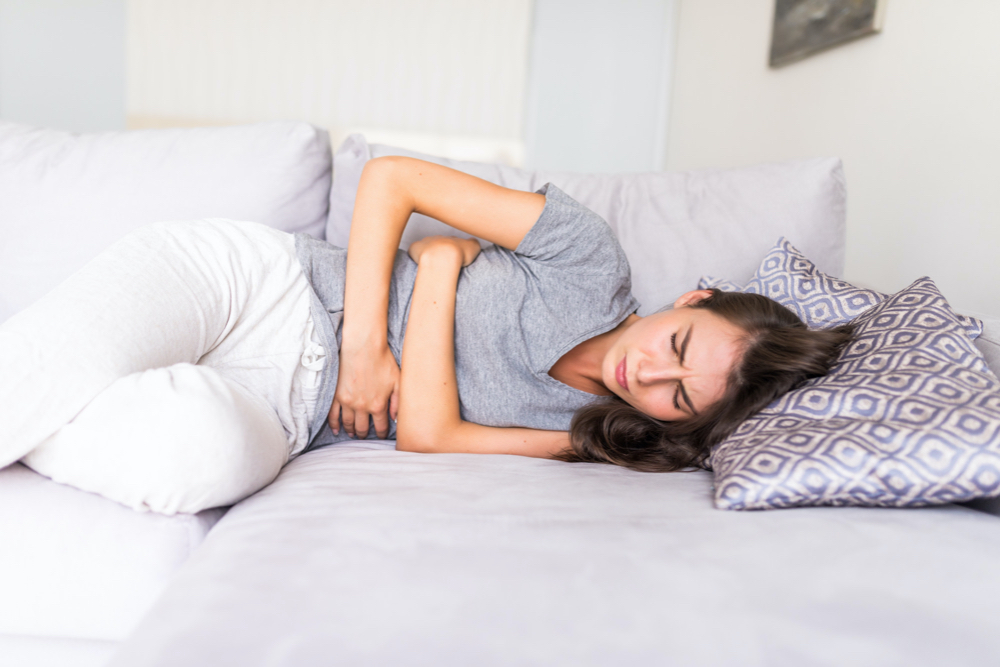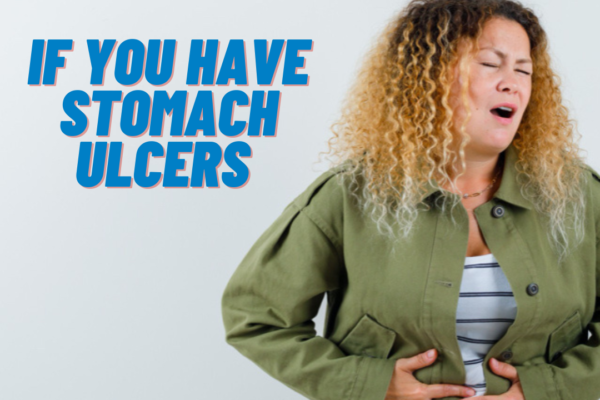To have a bloated stomach after eating a large meal is inevitable. But in other situations, it could be a symptom of a digestive disorder or other conditions involving your hormones. Nonetheless, a bloated stomach feels full and stretched out, and it often comes with pain and gas. And although certain medications can do the trick, you can induce relief through home remedies for bloating.
Check out the following tips, categorized based on your urgency to deflate the bloated stomach.
Disclaimer: These home remedies for bloating and gas pain should only supplement and not be treated as alternatives to the medical treatment prescribed by your healthcare provider.
Instant Relief for Bloating and Gas Pain
Feeling bloated with a side of flatulence and gas pain often requires immediate relief. Beyond discomfort, it could render you immobile and impact your productivity. If this is the case, consider the following remedies.
- Walk around

To ease bloating, go for mild-intensity exercises, such as a long or brisk walk. Doing so will allow you to clear intestinal gas and reduce symptoms of abdominal bloating.
Strolling along your neighborhood, at a nearby park, or even in your yard can help increase blood flow. In turn, it allows gas to be expelled from your body, deflating your bloated stomach. Thus, you may notice how you belch or fart when doing cardio activities.
- Apply a heating pad
Putting a heating pad on your abdomen can help relax your muscles and expel the excess gas in your gut. Do it for about 15 minutes to alleviate the pain of bloating. But keep in mind that this is a temporary solution, despite its ability to provide relief.
If you don’t have a heating pad, you can fill a water container with warm water or soak a small towel in hot water. With the last one, be careful not to hurt yourself by cooling the soaked towel a little.
- Soak in a warm bath
If you want to combine instant bloating relief with full-blown relaxation, immersing yourself in a warm bath can do the trick. The heat from the bath relieves the bloatedness while soothing your muscles and joints and lowering your stress level.
Soak in a warm bath for about 20 to 30 minutes. For best results, consider adding Epsom salts.
- Drink green tea, peppermint tea, or other herb drinks
Organic teas can be your ally in addressing digestive issues. Hence, it comes as no surprise that it makes the list of home remedies for bloating.
Herb drinks like green tea and peppermint tea contain high levels of flavonoids – compounds that prevent inflammation and muscle issues in the gut. By drinking these teas, you not only apply heat to your digestion, which, as established above, helps relieve bloating but also introduce flavonoids that help address other serious culprits for having a bloated abdomen.
Did You Know? Green tea is regarded as the healthiest beverage in the world – and for good reasons too. It helps in many critical functions of the body, like metabolism, waste removal, and of course, improving gut health.
- Take over-the-counter anti-gas medications
One of the medications you most probably keep at home is an anti-gas med, like pepto bismol. If you have this in your medicine cabinet, you can relieve bloating, gas, indigestion, and other digestive issues quickly.
However, don’t go as far as taking anti-gad medications all the time, especially if the condition recurs. Consult your doctor if you’re experiencing digestive distress often, as it may need a specific treatment, depending on the diagnosis.
- Do anti-flatulence Yoga poses
You can help your body pass gas and alleviate bloating by doing some Yoga poses. A popular one is called the wind relieving pose. To do this, you simply have to lie on your back, bend your knees and pull them close to your chest. Then, clasp your hands around the shin, right below the knees. Start lifting your neck and tucking your chin while pulling your knees in.
You can also do the child’s pose to encourage airflow out of your gut. Start with a kneeling position, with the front of your feet pressing onto the ground. Bend your knees in such a way that your buttocks almost touch your heels. Doing this will extend your arms forward and slide on the mat.
Keep this pose for five minutes, and you’ll find yourself expelling gas, which deflates your bloated abdomen.
- Massage your tummy
Don’t underestimate the power of touch. Rubbing your abdomen can help relieve bloating, not only because you expel some degree of heat but the motion of the massage encourages digestive motility.
Of course, you have to be cautious when massaging your gut area. Don’t put too much pressure, as you can exacerbate the digestive distress. Instead, do it gently in a clockwise direction. Add some massage oil and do this for two to three minutes.
Long-term Home Remedies for Bloating

If you’re prone to experience bloating due to certain triggers, you’ll be glad to know there are steps you can take to address the condition, which supplement the prescribed medication. In many cases, these home remedies for bloating provide permanent relief.
- Eat your food slowly and thoroughly
Chewing your food slowly and mindfully does a ton of benefits to your gut health. This simple act prevents indigestion, which contributes greatly to bloating. For one, having smaller portions of foods, generally referred to as bolus, ensures less fermentation in the intestine.
Gut fermentation is when ingested carbohydrates get processed by the good bacteria or fungi in the colon, producing ethanol by-products. This results in the release of gas, which expands the tissues, making your abdomen look bloated.
A recommended practice to mash and mince your food is to chew it 32 times. Highly textured and rough food should take more time. Nonetheless, make sure to be more mindful when you eat your food.
- Increase your fiber intake
Foods high in fiber, like many fruits and vegetables, allow for improved mobility in the intestines. This prevents the build-up of gas and bloating.
However, taking too much fiber also has adverse consequences. For one, it can cause constipation and added digestive distress, especially if it’s highly acidic.
When increasing your dietary fiber, do it gradually to prevent overwhelming your digestive tract. Also, lean more toward insoluble fibers that will help food pass quicker. These include whole grains, bran, and various vegetables.
- Add probiotics to your diet
Probiotics are any live microorganisms consumed or applied that provide added benefits to the body. For example, a form of vitamin K called menaquinone is produced by bacteria, such as lactic acid bacteria (LAB). You can typically find LAB in dairy products and fermented vegetables.
When it comes to bloating, probiotics alleviate the condition since it keeps the balance among different types of bacteria in the gut. Thus, it helps prevent fermentation that causes gas production – and bloating by extension.
The most recommended probiotic food sources include Greek yogurt, pickles, tempeh, sauerkraut, kefir, kombucha, and kimchi. You can also consider taking probiotic supplements, especially as recommended by your healthcare provider.
- Drink a glass of lemon water
Lemon is a powerhouse citrus packed with multiple vitamins and minerals. It also helps remove toxins in the gastrointestinal tract, alleviating indigestion. As a result, cases of bloating, heartburn, and gas pain can be managed and relieved. It can also stimulate a healthy bowel movement.
First thing in the morning, prepare a thinly sliced lemon and put it in a glass of water. Then, drink it on an empty stomach. Doing this daily can increase your digestive tract’s ability to cleanse out toxins and quickly rehydrate your body after hours of sleep.
- Cut back on foods high in sodium
The relationship between sodium and abdominal bloating is pretty simple. If you eat foods high in sodium or salt, your body will retain more water, resulting in bloating. In addition, excess sodium also disrupts efficient digestive functions.
The recommended daily salt intake is limited to about one teaspoon (2,300 mg), according to the Dietary Guidelines for Americans set by the Food and Drug Administration. However, most Americans consume more sodium, considering a lot of staple meals are high in salt.
So, if you’re bloating, consider creating a meal plan that includes foods with less amount of salt. In addition, stir clear from highly processed meat, chips, frozen dinners, canned goods, and other junk foods as they contain not only lots of salt but also other preservatives that could harm digestion.
- Avoid carbonated drinks
Carbonated drinks, as the name suggests, contain the gas carbon, which builds up in the GI tract. In addition, the added sweeteners can also be used for gut fermentation. Therefore, drinking soda and other fizzy beverages regularly can significantly contribute to bloating.
If you want to alleviate the condition for a long time, avoid drinking carbonated beverages and stick to water instead. These include soft drinks, carbonated wine, and sparkling water.
- Keep track of your food intake
Frequently experiencing bloating after you eat can be attributed to how much food you consume. Naturally, overeating will put extra strain on your gut health, causing distress in your GI tract. It leads to poor digestion and gas production.
But aside from the amount of food you eat, also check on their respective types. If you’re experiencing bloating and gas expulsion above the normal rate, check if your diet is predominantly made of carbohydrates.
A condition called carbohydrate malabsorption occurs when your intestine lacks an essential enzyme to process sugar of different forms. This results in gut fermentation which causes bloating and flatulence. It also has other side effects, such as diarrhea, cramping, and abdominal pain.
One common example of carbohydrate malabsorption is lactose intolerance. As the name suggests, people with lactose intolerance cannot process lactose – a type of carbohydrate found in dairy products. They lack the enzyme lactase, so they tend to look bloated and often produce more gas when consuming milk or other types of dairy.
Pro tip: Seasonal events often become hubs for overeating. Check out how you can prevent digestive issues during holidays.
- Replace chewing gums with peppermints
You may be surprised that chewing gums contribute to how much gas gets into your GI tract. So much so that experts often discourage this if you’re looking for relief for stomach gas pain and bloating.
When you chew gum, you are swallowing more air than when you’re eating other food products. The air you take in will build up in your digestive tract, causing you to look bloated.
It’s quite understandable why people chew gum. Primarily, it’s a quick way to freshen your breath. But if you have to, switch to peppermints or lozenges as part of your home remedies for bloating.
- Consult your doctor about certain medical conditions
It’s easy to take bloating for granted until you notice instant relief is almost unattainable. This might be due to the fact that a bloated abdomen is a symptom of an underlying condition that requires proper diagnosis and medical intervention.
Some of the health conditions causing bloating include irritable bowel syndrome, celiac disease, abdominal tumors, cirrhosis, ulcerative colitis, Crohn’s disease, and ovarian cancer, among others.
If bloating comes with other symptoms, see your doctor immediately.
- Get plenty enough sleep in a proper position
When sleeping, your body’s digestion tends to slow down at certain stages. However, the process picks up, and gastric emptying becomes significantly faster when you achieve rapid eye movement (REM) sleep. During this phase, your heart rate, breathing, blood pressure, etc., increases as your eyes move rapidly and your dreams become more vivid.
Sleep plays a crucial role in regulating digestion. For one, sleep deprivation increases stress which triggers the production of more cortisol. As a result, it may contribute to digestive distress, including problems in intestinal permeability and acid reflux.
In addition, lack of sleep can also drive hormonal imbalance, leading to bloating conditions, such as inflammation and disruption in the gut microflora homeostasis.
Aside from sleep quality, your sleeping position may influence gut health. Although more evidence is required to establish an accurate reference for this topic, many experts believe that sleeping on your left side helps more when it comes to digestion. That’s because gravity assists in keeping the food’s movement more streamlined throughout the GI tract.
- Avoid using straws
Frequently using straws in your drinks increases your risk of taking in excess gas, which, in turn, accumulates in the gut and causes bloating. Therefore, as part of the natural remedies for bloating, consider removing straws when you drink water or any beverage. Instead, go for the classic direct-to-glass sip if possible.
- Quit smoking
Consuming tobacco products, most notably via smoking, brings tons of harm to your body. While many people think of the lungs first when talking about smoking, it’s crucial to know that this habit also has adverse effects on gut health.
Tobacco products can irritate the intestinal walls causing abdominal pain, heartburn, bloating, and more. On top of that, the mere act of smoking forces users to inhale more air. This will then build up, causing your gut lining to expand. This is why, even with e-cigarettes or vapes, bloating can still be observed despite the assumption that both alternatives are better than cigarette smoking.
Did You Know? Nicotine withdrawal can also make you bloated. However, it’s only temporary as it comes with the symptoms of the transition. If you want to quit smoking, check out how you can manage cigarette withdrawal symptoms in eight steps. These tips will help you navigate the process smoothly and at a tolerable level of pain.
- Add exercise to your routine
To include exercise in your daily routine means protecting yourself from various health conditions, regardless of degree. In terms of gut health, being more active allows for better intestinal mobility, which helps in relieving and preventing bloating in the long term.
Experts recommend exercising for at least 30 minutes a day. You can start with light physical activities you can do at home or with a sport you’re really interested in, like swimming, playing tennis, cycling, etc.
Causes of Stomach Bloating and Gas Pain

Bloating is a reaction to unusual digestive activities, such as rapid bacterial fermentation, gas buildup, and so on. These conditions can be traced back to unhealthy habits or a far more serious health issue. The following are some of the most common causes of stomach bloating, associated with gas accumulation.
Constipation
When you’re constipated, stool remains longer in your colon. As a result, bacteria begin to process the waste, producing gas as a by-product, which leads to the expansion of the abdominal wall. Hence. You feel bloated until you’re able to address the constipation.
Food intolerance
Intolerance to certain food causes the production of excessive gas. On top of that, such conditions drive inflammation in the gut, which contributes to bloating.
Food intolerance is different from allergies. Food allergies happen when your immune system recognizes specific substances as foreign invaders that cause harm to the body. On the other hand, food intolerance is when your body reacts in a certain way when exposed to a particular substance in your food. An example of this is the protein gluten found in grains.
Digestive illnesses
Several gastrointestinal diseases have bloating as one of their symptoms. These include IBS, celiac disease, gastroparesis, small intestine diverticulitis, functional dyspepsia, and many more.
However, keep in mind that you can’t tell a specific illness based on a single symptom. Hence, if you experience bloating, the best thing to do is consult your doctor to get the digestive system blood tests and other lab work that correspond to your initial diagnosis.
Gynecological conditions
It’s no surprise that gynecological problems contribute to bloating since the lower abdomen covers the essential parts of the reproductive system, especially in women. For example, endometriosis, a condition wherein endometrial tissue grows outside the uterus, can cause bloating since the lining can extend to the intestinal area.
Also, women diagnosed with ovarian cancer observed a bloated abdomen. This can also extend to non-cancerous cyst formation in the ovary.
Outside these gynecological diseases, women also experience bloating at least once a month. This is because it’s a known symptom of premenstrual syndrome. It’s also a notable part of menopause. All these can be linked to the fact that hormones fluctuate the most during these periods, causing your body to retain more water.
Frequently Asked Questions
How do you know if bloating is serious?
If bloating is accompanied by abdominal pain and cramps, along with dizziness, nausea, and vomiting, check with your doctor, as it could be a sign of a serious health condition. Even more so if you experience a fever, diarrhea, blood in stool, and other symptoms of digestive distress.
Also, note if bloating and gas pain persist despite taking the prescribed medication and doing the natural remedies mentioned above.
How long does bloating last?
Typically, bloating should go away on its own in less than 24 hours. If it takes days for the bloating to be resolved, even with the recommended actions for relief, consider seeing a healthcare provider, as it could be a symptom of a digestive problem.
Can stress cause bloating?
Stress does not directly trigger bloating. However, it could lead to poor digestion, which may cause constipation, and in turn, cause bloating. Others may have a different experience since some people tend to speed up their metabolism during stress. Nonetheless, stress impacts other factors leading to bloating, such as lack of sleep, binge eating, and smoking.
The Bottom Line
A bloated stomach typically does not raise a serious concern. However, we can’t discount the fact that it causes discomfort, especially when accompanied by flatulence and gas pain. Also, when bloating recurs or does not respond well to medications and home remedies, it may indicate digestive issues that warrant an immediate trip to your doctor.
Related Articles:

